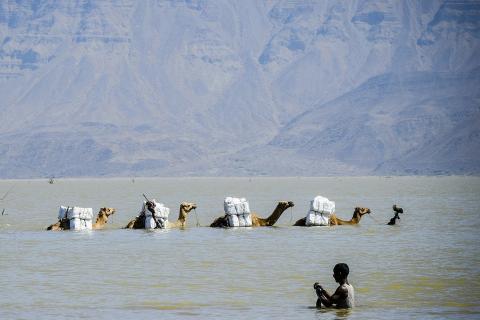Ethiopian Prime Minister Hailemariam Desalegn on Thursday announced he has submitted a resignation letter after the worst anti-government protests in a quarter-century, saying he hoped the surprise decision would help planned reforms succeed and create a “lasting peace.”
“I want to be part of the solution,” Desalegn said in remarks carried by the Ethiopian Broadcasting Corp. “I believe that the public’s demands and questions should be met and answered.”
It was not immediately clear whether lawmakers had accepted the resignation.

Photo: EPA
Ethiopia, one of Africa’s fastest-growing economies and a close security ally of the US, has been rocked by months of protests demanding wider freedoms that have left hundreds dead and tens of thousands detained. The government in recent weeks released more than 6,500 detained opposition figures, journalists and others after the prime minister in an unexpected announcement in January said he wanted to “widen the democratic space for all.”
The 53-year-old prime minister said he would continue in his role until the “power transition is completed.”
He is also seeking to unseat himself from the ruling Ethiopian People’s Revolutionary Democratic Front.
The ruling party, which controls all seats in parliament, accepted the resignation and lawmakers were yesterday expected to do the same.
The ruling party’s council is then expected to put forward Desalegn’s successor as prime minister.
Ethiopia’s demonstrations demanding wider freedoms began in late 2015 and engulfed much of the restive Oromia and Amhara regions before spreading into other parts of the nation, leading to a months-long state of emergency that has since been lifted.
“Political infighting between members of the ruling party has caused a serious fracture to the political establishment here,” opposition politician Yilikal Getnet said, adding that the fact that the prime minister hails from a minority ethnic group might have played a role in his resignation.
“There is no unity within the government. Plus the mass movement of people has rendered the party powerless and was pitting one official against the other,” Yilikal said.
Ethiopia’s government has long been accused of arresting critical journalists and opposition leaders. Rights organizations and opposition groups have called for their release, saying they were arrested on trumped-up charges and punished for their points of view.
A favorite to replace the prime minister is the head of Ethiopia’s Oromia region, Lemma Megerssa. Many see Lemma, the president of the largest federal state, as politically assertive and having the acceptance of many in the younger generation.
However, a legal academic at Mekelle Universtiy, Meressa Tsehaye, said the deputy prime minister is widely expected to succeed Hailemariam.
Another option is that the four core parties of the ruling coalition will elect a new party leader who then will lead the country.
“If both these don’t happen, then a caretaker or transitional government will be set up. I don’t see that a snap election will be needed here,” he said.

POLITICAL PRISONERS VS DEPORTEES: Venezuela’s prosecutor’s office slammed the call by El Salvador’s leader, accusing him of crimes against humanity Salvadoran President Nayib Bukele on Sunday proposed carrying out a prisoner swap with Venezuela, suggesting he would exchange Venezuelan deportees from the US his government has kept imprisoned for what he called “political prisoners” in Venezuela. In a post on X, directed at Venezuelan President Nicolas Maduro, Bukele listed off a number of family members of high-level opposition figures in Venezuela, journalists and activists detained during the South American government’s electoral crackdown last year. “The only reason they are imprisoned is for having opposed you and your electoral fraud,” he wrote to Maduro. “However, I want to propose a humanitarian agreement that

ECONOMIC WORRIES: The ruling PAP faces voters amid concerns that the city-state faces the possibility of a recession and job losses amid Washington’s tariffs Singapore yesterday finalized contestants for its general election on Saturday next week, with the ruling People’s Action Party (PAP) fielding 32 new candidates in the biggest refresh of the party that has ruled the city-state since independence in 1965. The move follows a pledge by Singaporean Prime Minister Lawrence Wong (黃循財), who took office last year and assumed the PAP leadership, to “bring in new blood, new ideas and new energy” to steer the country of 6 million people. His latest shake-up beats that of predecessors Lee Hsien Loong (李顯龍) and Goh Chok Tong (吳作棟), who replaced 24 and 11 politicians respectively

Young women standing idly around a park in Tokyo’s west suggest that a giant statue of Godzilla is not the only attraction for a record number of foreign tourists. Their faces lit by the cold glow of their phones, the women lining Okubo Park are evidence that sex tourism has developed as a dark flipside to the bustling Kabukicho nightlife district. Increasing numbers of foreign men are flocking to the area after seeing videos on social media. One of the women said that the area near Kabukicho, where Godzilla rumbles and belches smoke atop a cinema, has become a “real

‘POINT OF NO RETURN’: The Caribbean nation needs increased international funding and support for a multinational force to help police tackle expanding gang violence The top UN official in Haiti on Monday sounded an alarm to the UN Security Council that escalating gang violence is liable to lead the Caribbean nation to “a point of no return.” Special Representative of the UN Secretary-General for Haiti Maria Isabel Salvador said that “Haiti could face total chaos” without increased funding and support for the operation of the Kenya-led multinational force helping Haiti’s police to tackle the gangs’ expanding violence into areas beyond the capital, Port-Au-Prince. Most recently, gangs seized the city of Mirebalais in central Haiti, and during the attack more than 500 prisoners were freed, she said.